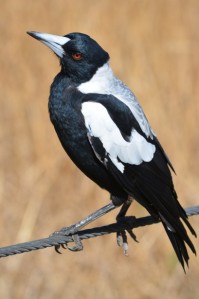Last year there was a lot of talk in the British papers about ‘Death by Cows’ following the recent death of a woman who was trampled in Wiltshire. In the summer of 2009 there were four people killed in a period of two months after being trampled by cows. While such attacks are relatively rare, in recent years a number of people across the UK have been killed or injured in similar incidents.
Walking my dog one morning, not far from our home in suburban Perth, Western Australia, with these thoughts in my head, I was startled by a whoosh and flash of wings, close enough to my face for me to feel the air move. I increased my pace and hesitantly turned, expecting to see a magpie. Instead I saw a wattlebird missile and I was in its direct path. It narrowly missed me, but connected with the top of my dog’s head. She was the target, not me. I broke into a jog, shoulders hunched and head tucked low, leaving the poor dog to fend for herself.
The stories of injuries caused by magpies and, in fact, death attributed to magpie attacks was fresh in my mind. I’d been listening to a wonderful programme on ABC Radio National as I drove home from work one day. The programme hadn’t dwelt on the injuries, but on the ability of the magpies to remember and to recognise people’s faces, their dislike of males rather than females, and the fact that they get infuriated by bicycles. More importantly, the swooping only happens when they have young in their nests for a few weeks in spring. In many areas these aggressive magpies are shot, but most people believe that there must be more humane ways of solving the problem. After all the magpie is one of Australia favourite birds. According to the Suburban Wildlife Research Group at Griffith University, if we had a better understanding of what triggers a magpie attack, it might be possible to develop better management strategies.They surveyed people who had been attacked, and found that despite being the target of magpie wrath, 90% of the victims didn’t want the magpie to be destroyed.
I loved this advice they offered:
How to avoid being attacked
- If you get attacked while riding a bike or horse, get off immediately
- If a particular bird is harassing you repeatedly, choose a different route for the next few weeks until the chicks fledge
- Wear an icecream container on your head when crossing magpie flightpaths
This got me thinking again. No, not about using an icecream container as a fashion accessory every spring, but about another wildlife problem.
Recently in Western Australia our Premiere, sanctioned by the federal environment minister (both Liberals), started the cull of great whites, tiger and bull sharks over three metres in length, even though the great white is classed as vulnerable on the IUCN red list of endangered species.
The first shark to be culled, a female tiger shark, was on Australia Day, January 26, 2014. I wondered at this day’s significance. It was a day when Australians traditionally took to the beaches in droves. I wondered how many of these beach goers would prefer a thriving marine environment to a lifeless ‘swimming pool’? For if the ecosystem is changed and predators are removed, then eventually the marine environment suffers and becomes degraded. If they witnessed the four bullets to the head that it took to kill that female tiger shark would they still approve? Doubtful. As with the magpies, compassion and common sense prevail.
International and national condemnation has followed these weeks of culling. In February, thousands of people protested in rallies around Australia, New Zealand and South Africa. Only this week the world’s top surfer, Kelly Slater voiced his support saying that killing sharks off the WA coast is ‘crazy’ and they should be left alone. The Conservation Council WA, Sea Shepard, Animal Amnesty, West Australians for Shark Conservation, the Greens and many of the people I see on the beach every day, applaud his comments.
But has our Premier been listening?
And so I come back to the story of the ‘killing cows’. Was there a call in the UK for farmers to cull these ‘dangerous’ animals? There certainly has been a number of deaths and many sightings of these ferocious creatures. People even stray into their environment to enjoy walks in the countryside, as we in Perth enjoy swimming in the ocean. A recent study found that the risk of being bitten by a shark while swimming off Perth in summer, is just one in 30 million. And, there has been only one fatality off a Perth metropolitan beach in the last 40 years. There has been an increase in shark attack around Australia, but also the population has grown significantly and there are more people in the water. Australia also has venomous snakes, poisonous spiders, box-jellyfish, stonefish, blue-ringed octopus, crocodiles and the humble bee. According to Australian Geographic the honey bee kills one or two Australians a year. On average, sharks annually claim fewer lives and spiders can be just as dangerous. Maybe our Premier would wish to wipe out all these potentially deadly creatures?
As for me, I think I’ll just keep on swimming in this beautiful ocean we are so privileged to have on our doorstep, walk my dog through the leafy suburbs in spring, take walks through the English countryside when I am fortunate enough to visit, and take pleasure in the life, whether it be ‘wildlife’ or ‘domesticlife’, that share these special places with me.
Other info from ABC RN: – Magpies are only aggressive for six weeks of the year, around August/September, when they have chicks in the nest.
– Most magpies attack the same few individuals again and again, possibly because they remind the bird of someone who once hurt them.
– Only the males attack (the females are too busy sitting on the eggs).
Magpies are excellent mimics and can even imitate the human voice.
Read more:
Magpies behaving badly › Nature Features (ABC Science) http://www.abc.net.au/science/articles/2002/07/04/2588235.htm
Western Australia’s shark cull will hit breeding stock of great whites
Bees more deadly than spiders in Australia Source: Australian Geographic Oct – Dec 2008
- Images:
http://www.publicdomainpictures.net/view-image.php?image=74617&picture=australian-magpie&large=1


You must be logged in to post a comment.